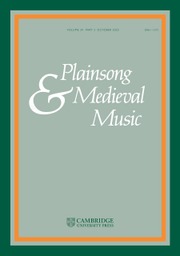No CrossRef data available.
Article contents
The Advenisti/Lauda Syon composer and his likely contributions to the later Trent Codices
Published online by Cambridge University Press: 28 April 2004
Abstract
This essay discusses the anonymous Trent 88 motet Advenisti / Lauda Syon (fols. 336v–337r), plus a batch of anonymous pieces in Trent 88 and Trent 89 which share similarities in their use of the sign O2, unconventional notation, number symmetries and style – all of which are features suggesting that their composer was a westerner rather than a German musician. Comparisons will be made with works by Busnoys, Barbingant and others. One of these anonymous pieces (a three-voice Mass exclusively using O2) is known to refer sporadically to Dufay's chanson Adieu m'amour. The presence of a further set of references in this Mass is also suggested, which may derive from Frye's motet Ave regina celorum.
- Type
- Research Article
- Information
- Copyright
- © 2004 Cambridge University Press




